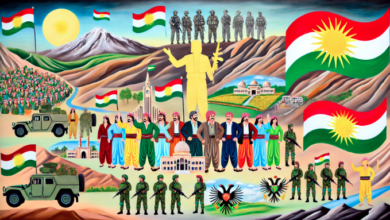The Kurdish Struggle in Syria: Reviving Kurdish Identity and Exposing Turkish Policies
The Kurdish struggle in Syria marks a pivotal chapter in the modern history of the Kurdish people, as it contributed to reviving Kurdish identity and solidifying the concept of “Kurdishness” across all parts of Kurdistan. Before the Syrian revolution erupted in 2011, the Kurdish issue in Syria was marginalized regionally and internationally due to the systematic exclusion imposed by the Syrian regime. Kurds in Syria suffered from policies of discrimination, including the denial of their language and culture, and the stripping of citizenship from thousands of individuals. However, with the collapse of central authority in Syria, Kurds filled the political and security vacuum by establishing the Autonomous Administration, which emerged as a pioneering model of resistance and societal organization.
The Kurdish experiment in northeast Syria was not merely a local project but had a profound impact on other parts of Kurdistan, inspiring Kurds in Turkey, Iraq, and Iran to hold on to their identity and national rights. The Autonomous Administration successfully united diverse communities in Kurdish-majority regions, presenting to the world a democratic model embodying the values of freedom and equality. This Kurdish resurgence in Syria coincided with growing international recognition of Turkey’s oppressive and discriminatory policies toward the Kurds.
Turkey’s policies against the Kurds are not new but span decades. Since the establishment of the Turkish Republic in 1923, the state adopted a policy of denying the existence of Kurds as an independent ethnicity, labeling them “mountain Turks.” Kurdish language use was banned, and any cultural or social practices reflecting Kurdish identity were prohibited. Despite these repressive measures, Kurds preserved their identity through continued struggle over the years. With the rise of the Justice and Development Party (AKP) under Recep Tayyip Erdoğan, Turkey entered a new phase of systematic repression, openly targeting Kurdish political and civil movements.
Within Turkey, a crackdown escalated against Kurdish politicians, including the arrest of mayors and parliamentarians affiliated with the Peoples’ Democratic Party (HDP). Kurdish party offices were shut down, and strict security measures were imposed in predominantly Kurdish areas. Turkey did not limit its repression to its borders but extended military operations into northern Syria and Iraq under the pretext of “counterterrorism,” targeting the Syrian Democratic Forces (SDF) and the Autonomous Administration in Syria, as well as the Kurdistan Workers’ Party (PKK) in Iraq.
Turkey’s actions were not confined to military offensives but included demographic engineering, as seen in its resettlement of Syrian refugees in Kurdish-majority areas, attempting to erase Kurdish identity altogether. While Ankara sought to justify its actions under the guise of national security, numerous international reports documented its deliberate targeting of civilians and the destruction of villages and infrastructure.
Today, the world no longer needs evidence to recognize the fascist nature of the Turkish regime, as its policies have become glaringly evident. Previously, Turkey exploited its NATO membership and economic ties with Western nations to mask its violations, but the situation has changed significantly. Global media outlets and human rights organizations have started to highlight Turkey’s crimes against the Kurds, exposing its discriminatory policies.
International solidarity with the Kurds has grown remarkably in recent years, as the world increasingly views them not merely as a party in an armed conflict but as a people facing a repressive system intent on erasing their identity and rights. This shift in global awareness creates new opportunities for the Kurdish struggle while simultaneously placing a great responsibility on the Kurds to continue advocating for their cause on the international stage through diplomacy and media efforts.
In conclusion, the Kurdish struggle in Syria was not just a fight for local rights but a humanitarian movement that revealed Turkey’s true face as a state practicing cultural extermination against an entire people. This struggle has reshaped the balance of power and transformed the Kurdish issue into a global human rights cause. At the same time, it presents significant challenges for the Kurds to persevere in their fight to secure their legitimate rights and build a fairer future for all peoples of the region.
